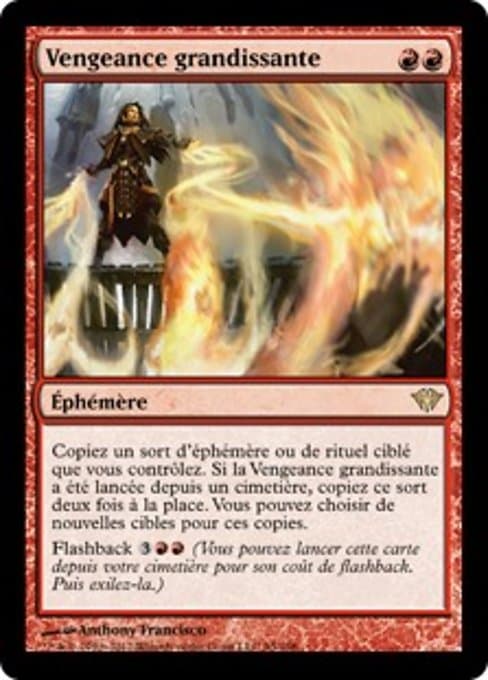
Vengeance grandissante
Éphémère
Copiez un sort d'éphémère ou de rituel ciblé que vous contrôlez. Si la Vengeance grandissante a été lancée depuis un cimetière, copiez ce sort deux fois à la place. Vous pouvez choisir de nouvelles cibles pour ces copies. Flashback (Vous pouvez lancer cette carte depuis votre cimetière pour son coût de flashback. Exilez-la ensuite.)
Illustrated by Anthony Francisco
· Dark Ascension (DKA)
Increasing Vengeance
#95 · Rare · French · Nonfoil/Foil
Legal Formats
| Standard |
| Pioneer |
| Modern |
| Legacy |
| Vintage |
| Commander |
| Oathbreaker |
| Alchemy |
| Explorer |
| Historic |
| Timeless |
| Brawl |
| Pauper |
| Penny |
Variants
Under Construction
Prints
Rulings
2011-01-22 : Each of the copies will have the same targets as the spell it's copying unless you choose new ones. You may change any number of the targets, including all of them or none of them. If, for one of the targets, you can't choose a new legal target, then it remains unchanged (even if the current target is illegal). If there are two copies, you may change the targets of each of them to different legal targets.
2011-01-22 : If the spell Increasing Vengeance copies has an X whose value was determined as it was cast (like Earthquake does), the copy has the same value of X.
2011-01-22 : If the spell Increasing Vengeance copies is modal (that is, it says “Choose one —” or the like), the copies will have the same mode(s). You can't choose different ones.
2011-01-22 : Increasing Vengeance can target (and copy) any instant or sorcery spell you control, not just one with targets.
2011-01-22 : When Increasing Vengeance resolves, it creates one or two copies of a spell. You control each of the copies. Those copies are created on the stack, so they're not “cast.” Abilities that trigger when a player casts a spell won't trigger. The copies will then resolve like normal spells, after players get a chance to cast spells and activate abilities.
2011-01-22 : You can't choose to pay any additional costs for the copies. However, effects based on any additional costs that were paid for the original spell are copied as though those same costs were paid for the copies too. For example, if you sacrifice a 3/3 creature to cast Fling and then copy it with Increasing Vengeance, the copies of Fling will also deal 3 damage to its target.
2021-03-19 : A spell cast using flashback will always be exiled afterward, whether it resolves, is countered, or leaves the stack in some other way.
2021-03-19 : If a card with flashback is put into your graveyard during your turn, you can cast it if it's legal to do so before any other player can take any actions.
2021-03-19 : To determine the total cost of a spell, start with the mana cost or alternative cost (such as a flashback cost) you're paying, add any cost increases, then apply any cost reductions. The mana value of the spell is determined only by its mana cost, no matter what the total cost to cast the spell was.
2021-03-19 : You can cast a spell using flashback even if it was somehow put into your graveyard without having been cast.
2021-03-19 : You must still follow any timing restrictions and permissions, including those based on the card's type. For instance, you can cast a sorcery using flashback only when you could normally cast a sorcery.
2021-03-19 : “Flashback [cost]” means “You may cast this card from your graveyard by paying [cost] rather than paying its mana cost” and “If the flashback cost was paid, exile this card instead of putting it anywhere else any time it would leave the stack.”
Comments
Under Construction